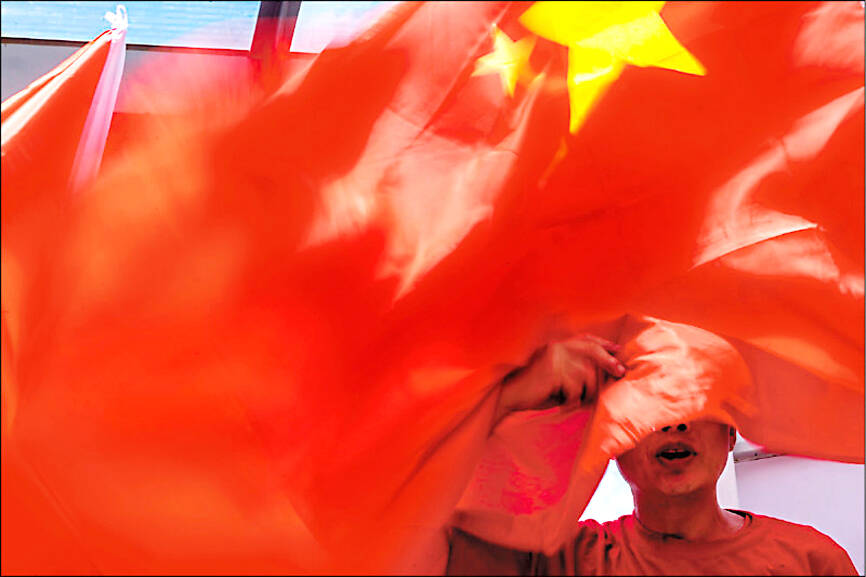Taiwanese rapper Chen Po-yuan (陳柏源) in a video showed how the Chinese Communist Party (CCP) bribes Taiwanese online influencers in its “united front” efforts to shape Taiwanese opinions.
The video was made by YouTuber “Pa Chiung (八炯)” and published online on Friday.
Chen in the video said that China’s United Front Work Department provided him with several templates and materials — such as making news statements — with some mentioning Chinese Nationalist Party (KMT) politician Hung Hsiu-chu (洪秀柱) and New Taipei City Mayor Hou You-yi (侯友宜) and asking him to write a song criticizing the Democratic Progressive Party.

Photo: Bloomberg
He said he had produced content for China as requested, but did not receive the royalties as promised by a Beijing-based management company for his song Chinese Bosses (中國老總), which is sung in an exaggerated Taiwanese accent with lyrics implying a pleasant life for businesspeople in China.
Chen said he also founded a company in China jointly with a business partner from the Jinjiang Taiwan Compatriots Friendship Association, who worked as his manager and later poached all his employees and capital invested in the company.
He was labeled as a fraud and a “Taiwanese independence separatist,” and attacked by Chinese Internet trolls, after he released an online video condemning his former business partner for betraying him.
“I finally realized the hard way that where I was staying [China] was not a place of democracy,” Chen said, adding that there is a huge difference between democratic Taiwan and autocratic China.
The Mainland Affairs Council yesterday said it is in control of the situation where Taiwanese influencers allegedly vilify the government’s policies, lure Taiwanese to work in China or engage in “united front” campaigns requested by the Chinese government.
The National Security Act (國家安全法) prohibits people from engaging, initiating, funding, hosting, manipulating, directing or developing an organization for a foreign country, including China, Hong Kong and Macau, external hostile forces, or any type of organizations, institutions, or groups established or controlled by them, or a representative dispatched by such organizations, institutions or groups, the council said.
The Anti-Infiltration Act (反滲透法) prohibits people from receiving instructions, being commissioned or funded by external hostile forces to engage in activities that disrupt social order, spread disinformation or interfere with elections, it said.
Article 33-1 of the Act Governing Relations Between the People of the Taiwan Area and the Mainland Area (臺灣地區與大陸地區人民關係條例) prohibits individuals, juristic persons, organizations or other institutions from engaging in any form of cooperation with the Chinese military, political parties or any organization of a political nature, it added.

A magnitude 7.0 earthquake struck off Yilan at 11:05pm yesterday, the Central Weather Administration (CWA) said. The epicenter was located at sea, about 32.3km east of Yilan County Hall, at a depth of 72.8km, CWA data showed There were no immediate reports of damage. The intensity of the quake, which gauges the actual effect of a seismic event, measured 4 in Yilan County area on Taiwan’s seven-tier intensity scale, the data showed. It measured 4 in other parts of eastern, northern and central Taiwan as well as Tainan, and 3 in Kaohsiung and Pingtung County, and 2 in Lienchiang and Penghu counties and 1

FOREIGN INTERFERENCE: Beijing would likely intensify public opinion warfare in next year’s local elections to prevent Lai from getting re-elected, the ‘Yomiuri Shimbun’ said Internal documents from a Chinese artificial intelligence (AI) company indicated that China has been using the technology to intervene in foreign elections, including propaganda targeting Taiwan’s local elections next year and presidential elections in 2028, a Japanese newspaper reported yesterday. The Institute of National Security of Vanderbilt University obtained nearly 400 pages of documents from GoLaxy, a company with ties to the Chinese government, and found evidence that it had apparently deployed sophisticated, AI-driven propaganda campaigns in Hong Kong and Taiwan to shape public opinion, the Yomiuri Shimbun reported. GoLaxy provides insights, situation analysis and public opinion-shaping technology by conducting network surveillance

Taiwan is gearing up to celebrate the New Year at events across the country, headlined by the annual countdown and Taipei 101 fireworks display at midnight. Many of the events are to be livesteamed online. See below for lineups and links: Taipei Taipei’s New Year’s Party 2026 is to begin at 7pm and run until 1am, with the theme “Sailing to the Future.” South Korean girl group KARA is headlining the concert at Taipei City Hall Plaza, with additional performances by Amber An (安心亞), Nick Chou (周湯豪), hip-hop trio Nine One One (玖壹壹), Bii (畢書盡), girl group Genblue (幻藍小熊) and more. The festivities are to

Auckland rang in 2026 with a downtown fireworks display launched from New Zealand’s tallest structure, Sky Tower, making it the first major city to greet the new year at a celebration dampened by rain, while crowds in Taipei braved the elements to watch Taipei 101’s display. South Pacific countries are the first to bid farewell to 2025. Clocks struck midnight in Auckland, with a population of 1.7 million, 18 hours before the famous ball was to drop in New York’s Times Square. The five-minute display involved 3,500 fireworks launched from the 240m Sky Tower. Smaller community events were canceled across New Zealand’s